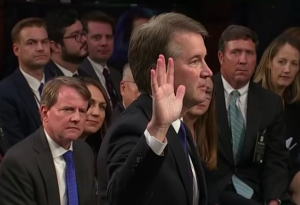There are legitimate and illegitimate reasons to oppose the nomination of Judge Brett Kavanaugh to the Supreme Court of the United States. Unfortunately, the illegitimate ones seem to be taking center stage right now.
The legitimate reasons relate to his jurisprudence. Judge Kavanaugh is a textualist and an originalist, as he made clear at his confirmation hearings last week. So liberals and progressives, who generally prefer a “living Constitution” jurisprudence, have ample grounds for opposing Judge Kavanaugh — and they should make that case to the public.[1]
The illegitimate reasons relate to Judge Kavanaugh’s integrity and ethics. As David French put it in an excellent essay for the National Review, the nominee has been the victim of unfair and unfortunate attacks on his character.
The most recent attacks accuse Judge Kavanaugh of committing perjury. He has testified for dozens of hours at three separate confirmation hearings — in 2004 and 2006 for the D.C. Circuit, and last week for the Supreme Court — and his opponents have been scouring this voluminous testimony to try and find what they view as false and misleading statements.
For example, last week Elie Mystal asserted in these pages that Judge Kavanaugh perjured himself by giving false testimony about two matters dating back to his time as a lawyer in the Bush Administration some 15 years ago: (1) his involvement in the controversial judicial nomination of Bill Pryor to the Eleventh Circuit, and (2) his involvement in a scandal known as “Memogate.”
Last week and over the weekend, I took to Twitter (@DavidLat) to evaluate these claims. After viewing the testimonial and documentary evidence, I concluded that the claims lack merit. For example, here’s my thread on the claims related to the Pryor nomination (ten numbered tweets, pasted below):
1. The key issue here is CONTEXT. The quotations by Kavanaugh that people are fixating on must be read in light of the entire 2004 hearing transcript, which is available here: https://t.co/cYGjTOdTEy – #SCOTUS #KavanaughHearings
— David Lat (@DavidLat) September 6, 2018
3. At Kavanaugh's 2004 hearing (Elie erroneously says it was 2006), in response to Senator Ted Kennedy, Kavanaugh explained that Bill Pryor's 11th Cir. nomination wasn't in Kavanaugh's portfolio: "not… assigned to me,""not one… I worked on personally." pic.twitter.com/slYE251Rsn
— David Lat (@DavidLat) September 6, 2018
5. Sandwiched in between these two perfectly clear explanations is the language that @ElieNYC, @nycsouthpaw and others fixate on: "I was not involved in handling [Pryor's] nomination." pic.twitter.com/mIUiYEb2ai
— David Lat (@DavidLat) September 6, 2018
7. The "not involved" statement that Kavanaugh's critics rip out of context CANNOT be fairly read as a blanket denial of any and all involvement, especially based on other testimony given by Kavanaugh in the very same colloquy.
— David Lat (@DavidLat) September 6, 2018
9. Even if you want to over-read the "not involved" line, perjury requires specific intent to mislead – which Kavanaugh obviously did not have, having ADMITTED to at least SOME involvement with the Pryor nom. https://t.co/PAdSbRAVsW
— David Lat (@DavidLat) September 6, 2018
10. So, in conclusion, this "perjury" argument is without merit — an unfair and unfounded attack against Judge Kavanaugh. Vote against him if you disagree with his jurisprudence, fine — but please don't slander him. Thanks. #SCOTUS #KavanaughHearings
— David Lat (@DavidLat) September 6, 2018
In a later thread, I offered a detailed response to the claims of “perjury” related to the Memogate/Manuel Miranda scandal that Elie also discussed.
The Pryor nomination and Memogate are not the only two subjects of “perjury” allegations against Judge Kavanaugh coming from the left. This Mother Jones article does a good job of outlining the five subjects that have been raised in this context: (1) Memogate/Manny Miranda, (2) NSA surveillance/warrantless wiretapping, (3) detainee treatment/torture, (4) the Pryor nomination, and (5) the similarly controversial nomination of Judge Charles Pickering to the Fifth Circuit.
In the past few days, I have responded to all of these claims in detailed Twitter threads (click on each topic to access my thread):
2. NSA surveillance/warrantless wiretapping
Additional claims have been made since then, but these are the major ones. For the reasons outlined in each thread, I respectfully submit that the claims are misguided.
As to the new claims — there seems to be a contest going on the left for who can come up with the most creative claim of perjury — in each case, ask yourself: is there clear evidence that the supposedly false testimony is both (1) significant and (2) intentional? Or does the claim of false testimony sound more like something that has been manufactured by someone who opposes Judge Kavanaugh?
Here’s a common response I’ve received to my explanations that Judge Kavanaugh didn’t perjure himself: “OK, maybe Judge Kavanaugh didn’t commit perjury. But wasn’t his testimony misleading/incomplete/not totally forthcoming? Shouldn’t we demand more for #SCOTUS?” This sounds very nice in theory, but it doesn’t work in the real world — for reasons I explain in this thread.
In these extremely partisan times, I realize that many people on both sides of the aisle have already made up their minds — and won’t be changing them. But for the (increasingly small) group of people in the middle — which includes the folks who will decide the fate of the Kavanaugh nomination, such as Senators Susan Collins (R-Maine), Lisa Murkowski (R-Alaska), Joe Donnelly (D-Ind.), Heidi Heitkamp (N.D.), and Joe Manchin III (W. Va.) — I hope that my detailed, evidence-based Twitter threads will be helpful.
And I hope that we can return to focusing on what really matters — Judge Brett Kavanaugh’s jurisprudence, and how a Justice Kavanaugh would affect the Supreme Court — as opposed to unfounded personal attacks.
P.S. In addition to my Twitter threads, check out Ed Whelan’s forthcoming series of blog posts that will address the attacks on Judge Kavanaugh in detail. You can find the introduction to the series here (and I’m guessing that Ed will add links to the subsequent installments as they go online).
[1] But note the testimony last week of liberal Yale Law professor Akhil Amar, a Hillary Clinton voter and strong supporter of past Democratic nominees to SCOTUS, who described Kavanaugh as “the best candidate on the horizon” and “the best choice from the long list of 25 potential nominees publicly circulated by President Trump.” If the Kavanaugh nomination gets defeated, will President Donald Trump’s new nominee be any more palatable to progressives?
The Character Assassination of Brett Kavanaugh [National Review]
5 Times Brett Kavanaugh Appears to Have Lied to Congress While Under Oath [Mother Jones]
Refuting Anti-Kavanaugh Smears — Introduction [National Review]
Earlier: Brett Kavanaugh Perjured Himself. He Should Be Impeached From The D.C. Circuit Soon.
 David Lat is editor at large and founding editor of Above the Law, as well as the author of Supreme Ambitions: A Novel. He previously worked as a federal prosecutor in Newark, New Jersey; a litigation associate at Wachtell, Lipton, Rosen & Katz; and a law clerk to Judge Diarmuid F. O’Scannlain of the U.S. Court of Appeals for the Ninth Circuit. You can connect with David on Twitter (@DavidLat), LinkedIn, and Facebook, and you can reach him by email at [email protected].
David Lat is editor at large and founding editor of Above the Law, as well as the author of Supreme Ambitions: A Novel. He previously worked as a federal prosecutor in Newark, New Jersey; a litigation associate at Wachtell, Lipton, Rosen & Katz; and a law clerk to Judge Diarmuid F. O’Scannlain of the U.S. Court of Appeals for the Ninth Circuit. You can connect with David on Twitter (@DavidLat), LinkedIn, and Facebook, and you can reach him by email at [email protected].


